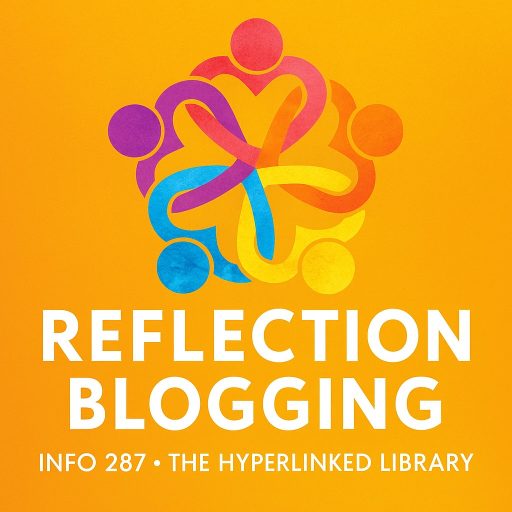 Reflection Blogging consists of five blog posts that will serve as a reflection journal for the modules included in our course content. Your audience is your fellow information professionals.
Reflection Blogging consists of five blog posts that will serve as a reflection journal for the modules included in our course content. Your audience is your fellow information professionals.
Reflection Blogging Assignment: Participatory Thinking in a Hyperlinked World
Overview:
Throughout the semester, you will maintain a reflective blog via our course site, serving as a space to explore ideas, pose questions, and connect course content to your developing professional identity. These blog entries are your opportunity to engage deeply with the course themes—participatory service, emerging technologies, user-centered innovation, and more—and to publicly think through what they mean for the present and future of libraries and information organizations and your professional practice.
Purpose:
Reflection blogging in INFO 287 invites you to internalize and personalize the material from each module. It’s a space to ask:
-
What resonates with me from this week’s module?
-
How do these ideas connect with real-world library service?
-
What assumptions are challenged, and what possibilities are sparked?
Each post should reflect your critical engagement and your own evolving thinking. Use it as a learning journal—but one shared with peers and the broader web, modeling the participatory spirit at the heart of this course.
Instructions:
- After exploring a module (including readings, lectures, and linked media), craft a post that reflects your intellectual and emotional response. You may choose to reflect on:
- The module as a whole
- A specific reading, video, or idea that stood out
- A question or insight sparked by the materials
- Connect course content with your personal experience, professional goals, and emerging identity as a librarian or information professional.
- Think aloud: Exploratory, uncertain, or evolving responses are welcome. Let curiosity lead.
- Include media in each post (e.g., photograph, infographic, video, embedded tweet, visual quote) to enrich your reflections.
- Engage with peers: Comment on others’ blogs or link to them in your own posts to foster community dialogue.
Tone and Creativity:
Let your blog reflect your unique voice and vision. Humor, storytelling, visuals, and creative expression are encouraged. Just as libraries adapt and reimagine themselves, let your blog evolve as a living, participatory reflection of your journey through INFO 287.
Blogging
- Reflection on Hyperlinked Communities
- Reflection on Hyperlinked Environments
- Reflection on New Models or New Horizons
- Reflection on The Power of Stories or WILD CARD*
- Reflection on Infinite Learning Modules
*Wild Card Blog Choice: revisit any past module or choose your own related topic!
Requirements
- If you’re writing a text-based assignment, it should be between 300 and 500 words.
- Video, audio or other media should carry similar content.
- Post on your course blog.
- Recorded content should be 5 -10 minutes long. (Please see Guidelines for Media-based Assignments)
- Include relevant links, images, and embedded media where appropriate.
- If you are using media, link to the artifact stored in the cloud or use the information on embeds here.
Insights on Reflection Blogging & CYOA from #hyperlib alum Nick:
Posting and Submission
- All postings will be published to your blog by the date specified on the course schedule. Because we use feeds and readers for this class, individual post URL submissions to Canvas are not required.
- At the end of the semester, you will submit your top level blog URL to Canvas for grading. The Reflection Blogging assignment is cumulative.
Evaluation Criteria (20 points total):
- Required Components (5 pts): Well-written, organized posts using media and visuals. Five entries submitted on time via the blog platform.
- Connections to Course Content (5 pts): Integration of readings, lectures, and discussions. Posts support ideas with references to module content.
- Comprehension and Analysis (5 pts): Insightful, thoughtful engagement with ideas. Posts show depth of understanding and reflection.
- Progression of Thought and Reflection (5 pts): Entries demonstrate intellectual growth and deepening understanding across the semester.
See full rubric here.
 This page was developed with support from Hyperlinked Library Insights, an AI-enhanced course partner that has been trained on the full content of INFO 287: The Hyperlinked Library, including modules, assignments, and grading criteria.
This page was developed with support from Hyperlinked Library Insights, an AI-enhanced course partner that has been trained on the full content of INFO 287: The Hyperlinked Library, including modules, assignments, and grading criteria.
